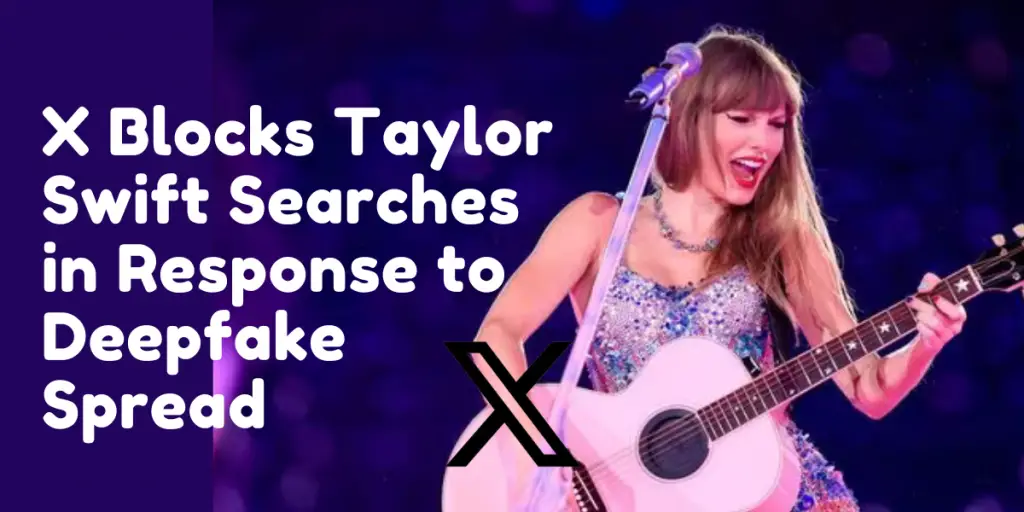X Blocks Taylor Swift Searches in Response to Deepfake Spread

In a digital era where artificial intelligence (AI) blurs the lines between reality and fabrication, the recent Taylor Swift deepfake controversy on X (formerly Twitter) has sparked a significant debate. This article delves into the incident, examining its implications and the responses from various entities.
The Taylor Swift deepfake incident on X highlights the challenges of AI-generated content, sparking legal and ethical debates and prompting responses from social media platforms and the White House.
Table of Contents
What Triggered the Taylor Swift AI Deepfake Controversy?
The Taylor Swift AI deepfake controversy was ignited by the circulation of sexually explicit, AI-generated images of the pop star on X, the social media platform formerly known as Twitter. This incident, which rapidly gained traction, highlighted the alarming capabilities of AI in creating realistic deepfakes. A particular post featuring these images attracted over 45 million views, 24,000 reposts, and numerous likes and bookmarks, causing widespread outrage. The images, believed to have originated from a Telegram group, spread across various accounts on X, with some even trending, thereby amplifying their reach. This controversy not only exposed the technological prowess of AI in manipulating images but also raised critical questions about consent, digital rights, and the ethical use of AI in creating content that can severely impact individuals’ lives and reputations.

How Did X (Formerly Twitter) Respond to the Deepfake Incident?
In response to the Taylor Swift AI deepfake controversy, X (formerly Twitter) took decisive action to mitigate the spread of the explicit content. The platform blocked searches for Taylor Swift’s name, a measure aimed at preventing further dissemination of the deepfake images. This step was described as a temporary but necessary action to ensure user safety. Additionally, X’s safety team actively worked to remove all identified explicit images and enforced strict actions against the accounts responsible for posting them. The platform reiterated its zero-tolerance policy towards non-consensual nudity, emphasizing its commitment to maintaining a safe and respectful environment for all users. This response from X underscores the challenges social media platforms face in regulating AI-generated content and the need for proactive measures to protect users from harmful digital content.
What Are the Legal Implications of AI-Generated Explicit Content?
The Current Legal Landscape
The proliferation of AI-generated explicit content like the Swift deepfakes poses complex legal challenges. Currently, the law struggles to keep pace with the rapid advancement of AI technology, leaving significant gaps in protection against such abuses.
The Need for New Legislation
The incident has amplified calls for new legislation specifically targeting non-consensual deepfake content. Lawmakers are advocating for laws that would criminalize the creation and distribution of such material, reflecting a growing awareness of the need for legal frameworks that can adapt to technological advancements.
Protecting Individual Rights
At the heart of this issue is the protection of individual rights in the digital space. The legal system must balance the need for freedom of expression with the imperative to protect individuals from harm caused by AI-generated explicit content, a task that is becoming increasingly complex in the age of deepfakes.
How is the White House Reacting to AI Misuse?
The White House’s reaction to the Taylor Swift AI deepfake incident was one of alarm and a call for legislative action. The Press Secretary expressed concern over the spread of false and non-consensual intimate imagery, highlighting the need for social media platforms to enforce their own rules against misinformation and non-consensual content. In response to this incident, the administration has taken several steps, including launching a task force to address online harassment and abuse, and establishing a national 24/7 helpline for survivors of image-based sexual abuse. The White House’s stance reflects a growing recognition of the potential dangers posed by AI technology and the urgency to regulate its use. Additionally, lawmakers are pushing for legislation that would criminalize the non-consensual sharing of digitally-altered explicit images, aiming to provide legal recourse and deterrence against such acts. This proactive approach by the White House and Congress signifies a commitment to addressing the challenges of AI misuse and protecting individuals’ rights in the digital age.
What Challenges Do Social Media Platforms Face with AI Content?
Balancing Freedom and Safety
Social media platforms are grappling with the challenge of balancing freedom of expression with the safety and privacy of users. As AI technology becomes more accessible, platforms must navigate the complexities of moderating content without stifling creativity and innovation.
Technological Limitations
Despite advancements in AI, detecting and preventing the spread of deepfake content remains a technological challenge. Platforms must continuously evolve their algorithms and moderation strategies to keep up with the sophisticated methods used to create and disseminate deepfakes.
Ethical Considerations
The ethical implications of AI-generated content are vast. Social media companies must consider the impact of deepfakes on individuals and society, fostering a digital environment that promotes respect and dignity while combating misinformation and abuse.
Also read:Where to See Taylor Swift AI Photos? And It’s Controversy
Final Words
The Taylor Swift deepfake controversy on X has brought to light the urgent need for comprehensive strategies to address the challenges posed by AI-generated content. From legal reforms to technological advancements and ethical considerations, the path forward requires a collaborative effort from lawmakers, tech companies, and society at large.

